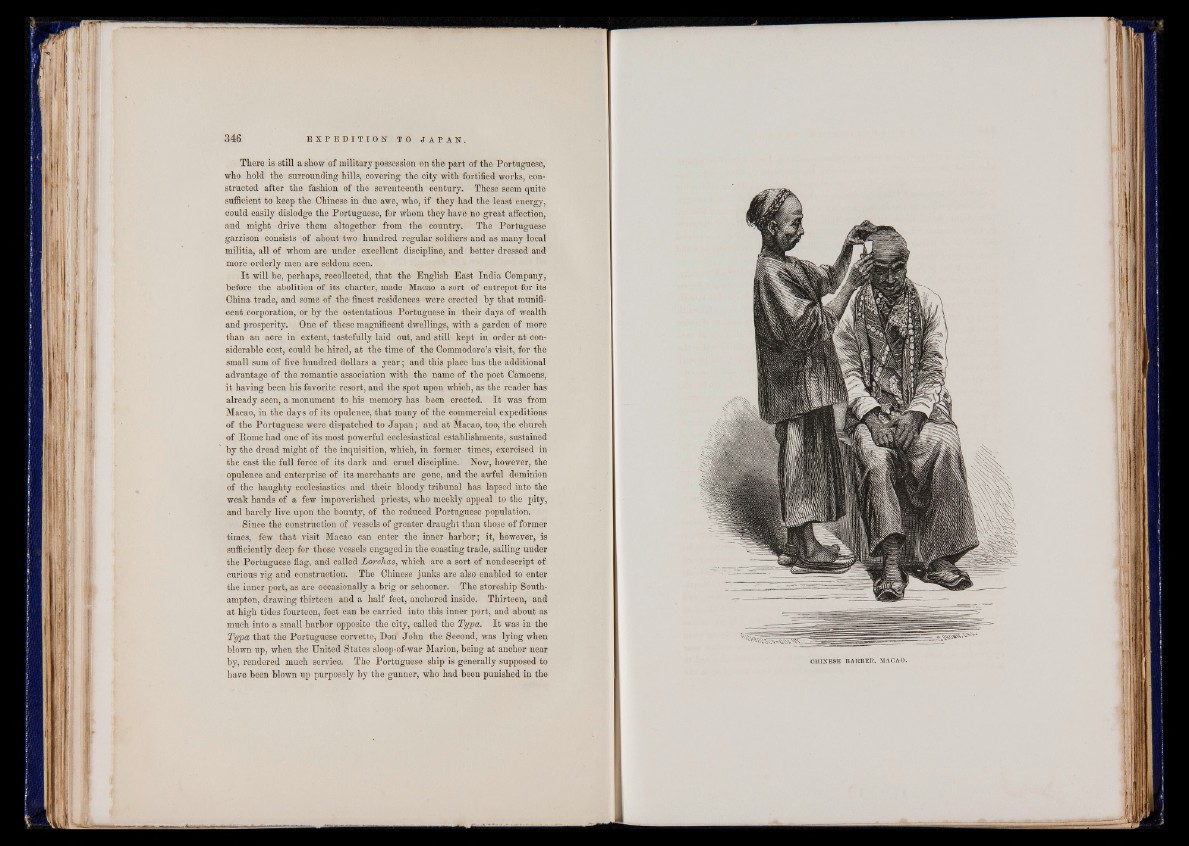
There is still a show of military possession on the part of the Portuguese,
who hold the surrounding hills, covering the city with fortified works, constructed
after the fashion of the seventeenth century. These seem quite
sufficient to keep the Chinese in due awe, who, if they had the least energy,
could easily dislodge the Portuguese, for whom they have no great affection,
and might drive them altogether from the country. The Portuguese
garrison consists of about two hundred regular soldiers and as many local
militia, all of whom are under excellent discipline, and better dressed and
more orderly men are seldom seen.
I t will be, perhaps, recollected, that the English East India Company,
before the abolition of its charter, made Macao a sort of entrepot for its
China trade, and some of the finest residences were erected by that munificent
corporation, or by the ostentatious Portuguese in their days of wealth
and prosperity. One of these magnificent dwellings, with a garden of more
than an acre in extent, tastefully laid out, and still kept in order at considerable
cost, could be hired, at the time of the Commodore’s visit, for the
small sum of five hundred dollars a year; and this place has the additional
advantage of the romantic association with the name of the poet Camoens,
it having been his favorite resort, and the spot upon which, as the reader has
already seen, a monument to his memory has been erected. I t was from
Macao, in the days of its opulence, that many of the commercial expeditions
of the Portuguese were dispatched to Japan; and at Macao, too, the church
of Rome had one of its most powerful ecclesiastical establishments, sustained
by the dread might of the inquisition, which, in former times, exercised in
the east the full force of its dark and cruel discipline. Now, however, the
opulence and enterprise of its merchants are gone, and the awful dominion
of the haughty ecclesiastics and their bloody tribunal has lapsed into the
weak hands of a few impoverished priests, who meekly appeal to the pity,
and barely live upon the bounty, of the reduced Portuguese population.
Since the construction of vessels of greater draught than those of former
times, few that visit Macao can enter the inner harbor; it, however, is
sufficiently deep for those vessels engaged in the coasting trade, sailing under
the Portuguese flag, and called Lorchas, which are a sort of nondescript of
curious rig and construction. The Chinese junks are also enabled to enter
the inner port, as are occasionally a brig or schooner. The storeship Southampton,
drawing thirteen and a half feet, anchored inside. Thirteen, and
at high tides fourteen, feet can be carried into this inner port, and about as
much into a small harbor opposite the city, called the Typa. I t was in the
Typa that the Portuguese corvette, Don' John the Second, was lying when
blown up, when the United States sloop-of-war Marion, being at anchor near
by, rendered much service. The Portuguese ship is generally supposed to
have been blown up purposely by the gunner, who had been punished in the
CH IN E S E B A R B ER , MACAO.